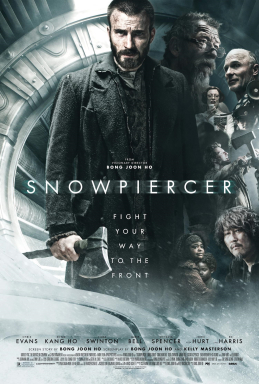In the near future, a chemical released into the atmosphere
to combat global warming plunges the planet into a deep freeze and kills most
life on earth. The survivors live aboard the Snowpiercer, a state-of-the-art
self-sustaining train that circles the earth. Poor passengers are crammed into
the tail of the train and treated like second-class citizens while wealthy
passengers live decadently in the forward cars, and the train’s brilliant
designer, Wilford (Ed Harris), is worshipped as a god. Sick of the injustice,
Curtis Everett (Chris Evans) leads his fellow tail passengers in a rebellion to
capture the rest of the train, but his disruption of the status quo carries a
terrible price.
Korean director Bong Joon-Ho’s English-language debut (a
loose adaptation of an obscure French graphic novel) is a film that is both
easy to be impressed by and easy to take to ask. An ambitious sci-fi allegory,
it is at once tense, provocative, well-shot, solidly acted, overlong,
ham-handed, and at times downright silly. But whether you love it or hate it, Snowpiercer at least makes an
impression.
If nothing else, the film is beautifully shot and scored. From
the industrial drudgery of the tail cars to the opulent refinement of the head,
each section of the train has an appropriately distinct visual identity. Bong’s
fight-scene choreography is as stylish as it is brutal, and there are aesthetic
homages to everything from Bioshock
to Terry Gilliam. Marco Beltrami’s score is hauntingly beautiful at times but
foreboding and discordant when it needs to be.
Though characters here are developed to varying degrees
(with varying success), the cast offers some laudatory performances. Evans previously
established his action star credibility as Captain America, and here he
showcases his range by playing Steve Rogers’ polar opposite. The beginning of
the movie sees Curtis as a reluctant leader, bold but principled. When his
friends fall by the wayside, however, he dirties his hands and doubles down on
his resolve. His background-revealing breakdown toward the end makes for one of
the film’s stronger moments. Korean stage vet Song Kang-Ho exudes surly mystique
and detached cool as Curtis’ reluctant ally Minsu, a drug-addled security
expert with his own agenda. Jamie Bell and Octavia Spencer are around for the
ride, but they don’t get enough screen time to flesh out their characters. In
opposition, the always-reliable Tilda Swinton seems to be having a blast doing
a quasi-Margaret Thatcher impersonation as Wilford’s condescending minister. As
the man himself, Harris is effective in a banality-of-evil sort of way, but his
closing summation is disappointingly long-winded and contrived.
This speaks to one of the film’s chief flaws: the pacing is
uneven and the runtime is padded. The first hour and a half or so are
suspenseful and full of urgency, but the film then inexplicably tapers off and
very nearly (pun intended) derails. The latter part of the film is so
exposition-heavy that it is almost as if Bong expended all of his considerable visual
creativity and couldn’t think of a better way to clue the audience in than
simply having characters talk at length.
Though not to the same extent, Snowpiercer’s tone is inconsistent as well. This isn’t always a bad
thing: Minsu’s sour observations and constant demands for drugs are genuinely
amusing. On the other hand, having a cadre of armed goons stop fighting to yell
“Happy New Year!” and having Curtis slip on a fish are head-shakers, to say the
least. There are several other odd moments – including a segment in a classroom
car – that feel off as well.
Sci-fi message movies (Elysium,
After Earth, etc.) are bountiful, but
movies of any genre that temper a message with a healthy dose of complexity and
ambiguity are not. For that reason alone, Snowpiercer
is worth your time. Look past the length and loquaciousness and enjoy the ride.
8/10

No comments:
Post a Comment